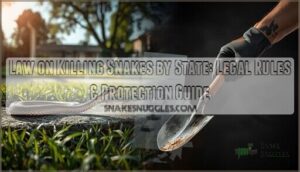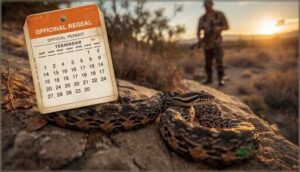This site is supported by our readers. We may earn a commission, at no cost to you, if you purchase through links.
You spot a native snake on your property, grab a shovel, and that single swing could land you with a $50,000 fine and six months in jail. Sound extreme? In states like California, New Jersey, and Massachusetts, killing any native snake—even the common garter sunning itself by your mailbox—violates blanket protection laws that carry criminal penalties.
The law on killing snakes by state creates a patchwork of regulations where what’s legal in Texas might be a prosecutable offense fifty miles away in New Mexico. Misidentifying a protected eastern indigo snake as a harmless black racer has cost landowners thousands in restitution fees, and claiming you didn’t know the law won’t shield you from prosecution.
Before you reach for that garden tool, you need to know exactly which species slither under legal protection in your jurisdiction, what exceptions actually exist for self-defense and property protection, and how wildlife enforcement agencies distinguish between lawful removal and criminal taking.
Table Of Contents
- Federal Laws on Killing Snakes
- State Laws Strictly Protecting Snakes
- States With Limited Snake Protection
- States Without Specific Snake Laws
- Seasonal and Permitted Snake Hunting
- Legal Exceptions to Snake Killing Laws
- Penalties for Killing Protected Snakes
- Snake Identification and Legal Risks
- Snake Removal and Relocation Laws
- Snake Conservation and Public Safety
- Frequently Asked Questions (FAQs)
- Why is it against the law to kill snakes?
- What two states are snake free?
- Can I kill a copperhead snake in my yard?
- Is it illegal to kill a snake?
- Are snake laws complicated?
- What laws stop people from killing snakes?
- Is it illegal to kill snakes in Virginia?
- Is it illegal to kill a snake in Texas?
- Is it illegal to kill snakes in Rhode Island?
- What state is it illegal to kill snakes?
- Conclusion
Federal Laws on Killing Snakes
You don’t get to decide which snakes live or die based on state lines alone. Federal law steps in with force when species face extinction, creating a legal framework that overrides local rules and carries penalties serious enough to bankrupt you or land you in federal prison.
Species like the rough green snake depend on these protections to survive as development continues shrinking their natural range.
Before you act, you need to understand three critical areas: how the Endangered Species Act works, which snakes it protects, and what happens when you violate it.
Endangered Species Act Overview
The Endangered Species Act protects snakes through a federal law framework that doesn’t mess around. You’re dealing with wildlife preservation that triggers critical habitat protection, species conservation reviews, and recovery plans once a snake makes the endangered list.
This federal regulation establishes ecological balance by prohibiting “taking” protected species—meaning you can’t kill, harm, harass, or even possess ESA-listed snakes without authorization, and violations carry penalties that’ll make you wish you’d called wildlife conservation experts instead.
To learn more about the Act’s protected species regulations, explore the official federal guidelines.
Federally Protected Snake Species
Twenty-one native snake species hold federal protection under the Endangered Species Act, and you’re legally barred from killing, capturing, or possessing them without permits. Protected species—including the eastern indigo snake, San Francisco garter snake, and eastern massasauga rattlesnake—receive critical habitat preservation through the Federal Endangered Species Act’s rigorous wildlife management protocols.
Conservation efforts target these protected species through:
- Species classification reviews addressing habitat loss and illegal trafficking
- Snake research programs monitoring population recovery
- Snake protection laws that cross state jurisdictional boundaries
The U.S. Fish and Wildlife Service continues expanding this framework, proposing two additional snake species for endangered status. For more insight into the legal frameworks supporting snake conservation, see this overview of key snake law protections.
Federal Penalties and Enforcement
Federal law doesn’t mess around when you kill protected snakes. The Endangered Species Act authorizes enforcement actions carrying fines exceeding $65,000 per knowing civil violation, and criminal convictions can hit you with additional penalties plus a year behind bars.
Federal fines under this penalty structure reflect the severity of wildlife conservation and protection violations, with judicial process requirements ensuring due process before sanctions land. Compliance strategies matter—agencies pursue both administrative citations and court cases, while citizen suits allow private individuals to trigger enforcement actions against violators, creating multiple pathways for prosecution under snake killing laws and regulations.
State Laws Strictly Protecting Snakes
You can’t kill snakes in certain states, period. These jurisdictions don’t care if the snake is venomous or harmless.
They also don’t care if the snake is sitting on your porch—state law bans killing them outright, with steep fines and potential jail time if you ignore the rules.
Here’s where blanket protection applies, which species get the most legal muscle, and what happens when you break these laws.
States With Blanket Snake Protection
You’re breaking the law if you kill a snake in several states, period. These jurisdictions enforce blanket protections covering all native species, venomous or not, and wildlife management agencies don’t tolerate unauthorized removal. Conservation-focused perspective drives these policies, balancing ecological balance with public safety concerns.
States with complete snake protection include:
- Alabama – prohibits killing any snake species, with enhanced penalties for federally protected eastern indigo snakes
- Georgia – classifies unauthorized snake killing as a misdemeanor under wildlife conservation efforts
- Maryland – extends species preservation protections to all native serpents statewide
State laws vary, but these jurisdictions take snake conservation seriously.
Key Protected Species by State
Protected species lists differ wildly across jurisdictions, and you need to know exactly which snakes your state shields before making any moves. New York’s Eastern Massasauga rattlesnake holds dual federal and state endangered status, while Connecticut’s wildlife laws single out the timber rattlesnake as their only protected serpent.
New Mexico’s state regulations cover the gray-banded kingsnake, narrow-headed garter snake, and New Mexico ridge-nosed rattlesnake through species-specific protections. Virginia maintains a Wildlife Action Plan identifying multiple snake species as conservation priorities requiring habitat preservation.
These state-level protected areas and species conservation efforts supplement federally protected designations, creating layered legal frameworks you can’t ignore.
Penalties for Unlawful Killing
You’re looking at misdemeanor charges in states with blanket snake protection, but Federal Fines stack when you kill Federally Protected species—$50,000 per violation under endangered snake killing laws.
State Laws add their own punch: $500 to $5,000 fines, Jail Sentences up to a year, and Wildlife Restitution costs that dwarf prosecution expenses when ecosystem damage gets calculated.
Conservation Penalties multiply if your misidentification defense crumbles, leaving you with Legal Liability for Prison time and financial ruin you never saw coming.
States With Limited Snake Protection
Not every state draws a hard line in the sand regarding snake protection. Some states carve out middle-ground laws, protecting certain species while leaving others outside the legal fence, and you’ll need to know which snakes fall where before you act.
Here’s how species-specific rules, hunting licenses, and legal exceptions shape your options in states with partial protection.
Species-Specific Protection
You can’t just kill any snake you see—targeted Species Conservation rules protect endangered and threatened snakes while allowing Wildlife Management of others. Illinois shields 11 natives under State Laws, making their removal a prosecutable offense. Florida enforces Snake Protection for eastern indigos and rim rock crowned snakes, both casualties of Habitat Preservation failures. Nebraska blocks killing Timber Rattlesnakes and Prairie Kingsnakes to maintain Ecological Balance, while New Mexico caps Gray-Banded Kingsnake harvest through annual limits.
These Protected Species designations drive Biodiversity Protection efforts:
- Endangered Species Act listings trigger federal oversight and state cooperation
- Venomous Snakes receive varied treatment based on local population health
- Conservation status changes as monitoring reveals population trends
Hunting License Requirements
You can’t bypass hunting license requirements just because a snake isn’t federally protected—many states with limited snake protection still demand proper authorization before you handle, capture, or kill any reptile.
License Fees and Residency Rules differ wildly, with nonresidents paying double or triple what locals pay. Hunter Education courses may be mandatory for first-time applicants, and Endorsement Requirements can add complexity depending on License Types you select.
Kansas and Idaho enforce these wildlife conservation laws strictly, treating unlicensed snake taking as serious violations even when the protected species isn’t endangered.
Allowed Exceptions
Self Defense grants you clear authority to kill a snake when it poses an immediate threat to human safety, though you must prove the danger was real, not imagined.
Property Rights extend this protection when snakes threaten livestock or crops under Agricultural Exemptions in most state laws.
Emergency Killing provisions cover narrow circumstances where federally protected species endanger life, but documentation requirements apply. Snake protection laws demand you exhaust nonlethal options first, making proactive prevention your safest legal strategy.
States Without Specific Snake Laws
You might be shocked to learn that some states don’t regulate snake killing at all, leaving you with no legal guidelines and no protection for native species. This legal vacuum creates confusion for residents who want to act responsibly, and it poses serious threats to snake populations that desperately need conservation safeguards.
Here’s what you need to know about states without specific snake laws, what this means for you as a property owner, and why wildlife advocates are sounding the alarm.
States Lacking Snake Protection
You won’t find dedicated snake protection laws in Alaska, Hawaii, Montana, North Dakota, or South Dakota—these states leave snakes outside species-specific regulation, meaning you can legally kill most native snakes without facing state prosecution.
Only federally endangered species trigger penalties, so your decision hinges on federal lists rather than state laws. This regulatory gap affects wildlife management and species preservation, leaving ecological balance and human safety questions largely to landowner discretion and general wildlife provisions.
Implications for Residents
Living in a state without dedicated reptile regulations by state means you shoulder the entire burden of responsible decision-making around snake encounters—and that burden hits harder than you might expect. Without clear community guidelines, homeowner liability becomes a murky zone where one wrong move can spiral into federally protected species violations, property risks you didn’t see coming, and resident safety issues that multiply when neighbors follow your lead.
You’re free to act, sure, but here’s what that freedom actually means:
- Federal endangered species penalties still reach $50,000 even when state law stays silent
- Misidentified protected species turn property owners into accidental lawbreakers facing prosecution
- Removing natural rodent control raises crop damage and disease spread on your land
- Wildlife conservation efforts suffer when individual actions compound across neighborhoods
- Animal welfare and protection standards fall entirely on your judgment, not regulatory guardrails
Conservation Concerns
You can’t expect species preservation when unregulated killing chips away at populations already stressed by habitat loss—some tropical regions lost 40 percent of snake habitat over ten years. Without wildlife protection frameworks, endangered species decline before triggering federal intervention.
Habitat preservation and biodiversity conservation demand proactive wildlife conservation and protection, not reactive cleanup. The table below shows how ecosystem balance and biodiversity suffer when snake conservation falls through regulatory gaps:
| Conservation Need | Without State Laws | Impact on Ecological Balance |
|---|---|---|
| Habitat Preservation | No funding allocated | Fragmentation isolates populations |
| Species Decline Monitoring | Rare or absent | Populations crash before federal listing |
| Public Education | Minimal outreach | Fear-based killing continues |
| Wildlife Protection Enforcement | Federal ESA only | $50,000 penalties arrive too late |
| Biodiversity Conservation | Individual judgment | Ecosystem balance collapses gradually |
Seasonal and Permitted Snake Hunting
You can’t just grab a snake whenever you feel like it. Most states with legal snake hunting impose strict seasonal windows, bag limits, and permit requirements that you need to follow to the letter.
Here’s how designated hunting seasons, permits, and state-specific rules regulate when and how you’re allowed to take snakes.
Designated Hunting Seasons
Your window for legal snake harvest isn’t a free-for-all. Wildlife calendars set by state agencies open and close seasons based on breeding cycles, regional climate, and conservation efforts—northern zones usually start earlier while coastal areas split waterfowl-style segments.
You can’t hunt federally protected or certain protected species during any season, and zone restrictions mean your hunting license might be valid in one county but worthless twenty miles away. Check annual updates before you act.
Bag Limits and Permits
Your hunting license doesn’t hand you unlimited power—bag limits cap exactly how many snakes you can take per day or season, and crossing that line turns your harvest into a wildlife violation. Permit requirements vary sharply: some states demand separate reptile stamps, others fold snake harvesting into general hunting regulations, while federally protected species stay off-limits entirely.
Here’s what governs your legal take:
- Daily possession limits reset with each hunting period
- Species-specific quotas protect vulnerable populations
- Carcass tagging documents your compliance instantly
- License fees fund enforcement and habitat conservation
Misidentifying protected species while claiming you stayed within bag limit rules won’t shield you from prosecution.
State-by-State Hunting Rules
Regulations shift dramatically when you cross state lines—your hunting license valid in Oklahoma won’t cover Pennsylvania’s timber rattlesnake season, and Utah’s species-specific quotas don’t mirror Texas’s hands-off approach to private land snake removal.
Some states mandate separate snake permits alongside general hunting credentials, others fold reptile harvesting into existing wildlife regulations, while federally protected species like the Eastern indigo snake remain untouchable regardless of your location.
Conservation efforts drive these distinctions: Pennsylvania restricts copperhead and rattlesnake seasons to narrow windows, Oklahoma requires documented permits for rattlesnake roundups, and Utah enforces bag limits tied directly to wildlife management data. Verify current state and federal wildlife laws before you act—state laws governing protected species change, enforcement is real, and claiming ignorance after misidentifying a federally protected snake won’t save you from prosecution.
Legal Exceptions to Snake Killing Laws
You can’t kill snakes at will, but the law doesn’t expect you to stand by while one threatens your life or livelihood.
Most states carve out specific exceptions that allow lethal action when there’s genuine danger to yourself, your animals, or your property. Here’s where the legal boundaries shift in your favor—and where they absolutely don’t.
Self-Defense and Property Protection
Self defense laws let you kill a venomous snake threatening immediate harm, but your response must be proportional to the danger. If a venomous snake corners you in your garage, that’s an imminent threat—reasonable force applies, and most states, especially those with castle doctrine provisions, support your decision to protect yourself on private property.
But spotting a snake near your deck doesn’t justify lethal action, even against venomous snakes. Protected species remain protected unless the danger is direct, unavoidable, and happening now. Misreading the situation invites prosecution, hefty fines, and regret over killing snakes that posed no real risk.
Agricultural and Livestock Protection
Your cattle operation doesn’t grant unlimited authority to kill snakes, even when venomous species roam pastures near livestock security zones. Most states allow lethal force only when snakes pose direct, documented threats to animal welfare—like a rattlesnake coiled near calving pens or a copperhead threatening poultry.
Farm safety laws recognize these risks, but protected species remain protected unless danger is immediate. Document encounters, photograph the threat, and consider professional wildlife management services for non-venomous or rare species. Misidentifying a protected snake while defending crops or implementing pest management destroys your legal defense and invites prosecution.
Emergency Situations
When crisis management seconds tick by, you don’t have time to debate wildlife removal protocol with a venomous snake blocking your path to an injured child. Courts recognize emergency response situations where immediate danger justifies lethal action—snake bites threatening human life, medical emergencies requiring urgent access, or survival tactics protecting vulnerable family members all meet legal thresholds if the threat is genuine and unavoidable.
Self-defense standards demand proportional response. Document the scene when safely possible—photos, timestamps, witness accounts—because protected species violations carry federal penalties even during emergencies. Snake protection laws don’t evaporate during crises, but prosecutors assess reasonableness.
| Emergency Scenario | Legal Justification | Required Evidence |
| Blocking medical access | Imminent harm to injured person | Timeline, injury documentation |
| Active snake bites | Direct physical threat | Medical records, photos |
| Occupied building invasion | Public safety risk | Incident reports, location proof |
| Child/elderly protection | Vulnerable person endangered | Witness statements, scene evidence |
Professional snake removal remains your safest legal option whenever seconds permit that choice.
Penalties for Killing Protected Snakes
You’re looking at serious legal consequences if you kill a protected snake, whether you knew it was protected or not. Federal violations under the Endangered Species Act carry the harshest penalties, including fines that can financially cripple you and potential jail time that puts your freedom at risk.
Here’s what you need to know about the specific penalties, the criminal charges you might face, and why misidentifying a snake can land you in legal trouble just as quickly as intentional harm.
Fines and Legal Consequences
You could owe more than your mortgage payment if you kill the wrong snake. Federal fines under the Endangered Species Act hit $50,000 per violation for federally protected species, while state-level court penalties range from $500 to over $10,000 depending on the species and your record. Beyond fines, legal liability extends to wildlife restitution costs that fund endangered species preservation programs, and conservation enforcement agencies track repeat offenders aggressively.
- Federal civil penalties can exceed $65,000 for knowing violations of wildlife law and regulation
- State fines escalate sharply for repeat offenses or multiple protected snakes
- Courts may impose wildlife restitution fees covering habitat restoration and recovery programs
- Unpaid fines trigger interest charges, wage garnishment, or additional legal action
Jail Time for Endangered Species
You risk a year in prison for a first federal offense harming endangered species under the Endangered Species Act, and repeat convictions within twelve months can push jail sentences toward five years when wildlife crimes involve intent or commercial trafficking.
State charges stack on top of federal offenses, meaning you could face dual prosecution and consecutive prison terms that turn a single mistake with federally protected snakes into years behind bars and devastated conservation efforts you’ll pay for twice.
Consequences of Misidentification
Misidentification carries harsh Legal Ramifications—you’ll face Wrongful Charges and fines even when Species Mistakes stem from honest confusion, since courts seldom accept ignorance as defense under the Endangered Species Act.
Your inability to distinguish Protected Species from common snakes, particularly separating Venomous Snakes from NonVenomous Snakes, triggers prosecution regardless of intent while inflicting severe Conservation Impact through unnecessary deaths of already vulnerable populations that Misid Consequences compound across entire ecosystems you’ve irreparably damaged.
Snake Identification and Legal Risks
You can’t legally kill what you can’t correctly identify. Misidentifying a protected snake as a common species won’t shield you from prosecution, fines, or even jail time.
Here’s what you need to know about distinguishing venomous snakes from non-venomous snakes and the legal risks of getting it wrong.
Venomous Vs. Non-Venomous Species
Before you make a move around any snake, understand this: distinguishing venomous species from nonvenomous species determines your legal exposure, not just your physical safety. Snake behavior and fang structure offer your clearest field indicators—venomous snakes usually display triangular heads, heat-sensing facial pits, and vertical pupils, while their nonvenomous counterparts show rounded heads and circular pupils.
Venom types matter beyond medical consequences because the Endangered Species Act and federal law protect certain venomous species more aggressively than harmless ones, flipping conventional assumptions about which snakes you can legally touch. Species classification under snake protection statutes doesn’t follow natural danger levels, meaning a venomous copperhead might lack protection while a nonvenomous indigo snake carries felony-level safeguards.
- A timber rattlesnake‘s triangular head and facial pits signal both venom delivery systems and potential federal protection
- Nonvenomous rat snakes flatten their heads defensively, mimicking venomous species and triggering wrongful killings
- Snake ecology reveals venomous and nonvenomous species occupy overlapping habitats, complicating field identification
- Federal databases list nine protected snake species without prioritizing venomous versus nonvenomous classifications
Importance of Accurate Identification
Knowing the difference between a rat snake and an eastern indigo changes everything—one’s harmless, the other federally protected. Species recognition through reliable identification methods prevents conservation impact disasters when you mistake a threatened species for a common pest.
Snake misidentification carries ecological consequences beyond legal trouble, disrupting population data that wildlife agencies use for protection decisions. Venomous and nonvenomous snakes often share your property, so learning accurate snake identification protects you from unintended violations of snake protection laws and the Endangered Species Act.
Your field guide becomes your legal defense when protected species show up uninvited.
Misidentification and Legal Liability
You kill what you think is a copperhead, and wildlife officers arrive with DNA proof it was an endangered eastern indigo—suddenly you’re staring down federal prosecution under the Endangered Species Act with fines exceeding $65,000 and potential jail time. Species misidentification doesn’t excuse liability in most courts; prosecutors challenge your identification errors with expert herpetologists who testify you should’ve verified before acting. Even honest mistakes between venomous and nonvenomous snakes trigger legal consequences when protected species die. Federal law and strict state statutes don’t recognize “I thought it was dangerous” as a defense, leaving you facing prosecution challenges that hinge on what you should have known, not what you believed.
Misidentifying a protected snake won’t save you from federal prosecution—courts demand you should have verified before you acted
Here’s what liability risks look like when snake identification goes wrong:
- Expert witnesses dissect photographs proving your “cottonmouth” was actually a protected water snake
- Field officers use measuring tools and scale counts to confirm species status at the scene
- State prosecutors present habitat data showing endangered species documented in your exact location
- Courts review whether you consulted identification guides or contacted professionals before killing
- Restitution orders force you to fund habitat restoration beyond standard fines for the species loss
Snake Removal and Relocation Laws
You can’t just grab a snake and dump it somewhere else without breaking the law. Most states regulate how you handle, transport, and relocate snakes, whether you hire a professional or try doing it yourself.
Here’s what you need to know about legal removal services, DIY relocation rules, and permit requirements before you move that snake off your property.
Legal Snake Removal Services
Licensed professional snake removal isn’t just about convenience—it’s your best defense against violating wildlife law and regulation that varies wildly from state to state. Most jurisdictions require wildlife permits for anyone capturing or transporting native species, and legitimate removal services hold the necessary service licensing, carry liability insurance, and understand environmental law and regulations governing snake handling in your area.
Here’s what professional removal delivers:
- Species expertise prevents costly misidentification of protected snakes subject to snake protection and conservation statutes
- Humane removal methods comply with legal standards for capture, transport, and snake relocation to appropriate habitats
- Emergency response when venomous snakes threaten your family, pets, or livestock without breaking federal or state rules
- Documentation of removal events if authorities question your compliance with snake protection laws
- Cost savings compared to fines exceeding several thousand dollars for improper snake removal attempts
DIY Relocation Rules by State
DIY snake relocation isn’t a free-for-all, and your state’s wildlife regulations determine whether you can move that serpent yourself or face hefty fines. At least 22 jurisdictions—California, Illinois, Hawaii among them—ban amateur reptile protection efforts without written authorization.
Misidentify a protected species during wildlife removal, and you’re looking at investigations in over 15 states. Illinois mandates IDNR permits and original-site release only; Hawaii slaps violators with $200,000 fines plus three years imprisonment for unauthorized snake relocation, transport, or possession under federal law and state regulations.
Permit Requirements for Handling
Touching that serpent lounging on your porch without the right paperwork can trigger criminal charges in most states, so pay attention to permit applications before you intervene. Wildlife regulations demand documented handling training—you’ll prove your competency with venomous and non-venomous species through courses that cover species identification, relocation methods, and safety protocols mandated by state and federal law. Snake removal permits aren’t rubber stamps; agencies scrutinize your experience, insurance, and equipment, then enforce strict reporting whenever you encounter protected reptiles.
- Permits require annual renewal with updated certifications in over a dozen jurisdictions
- Record-keeping mandates track every snake’s species, location, date, and final outcome
- Violations trigger wildlife officer inspections, fines exceeding $500, and permit revocation
Snake Conservation and Public Safety
You can’t separate snake law from the reasons those laws exist in the first place. Understanding how snakes fit into ecosystems, how they protect you from actual threats like disease-carrying rodents, and what you can do to avoid dangerous encounters will make the legal framework make sense.
Here’s what conservation and public safety actually look like when they work together.
Role of Snakes in Ecosystems
You’re staring at a critical link in the food web when you see a snake, because these predators anchor ecosystem balance by consuming rodents that destroy crops, spread disease, and wreck soil quality through overgrazing.
Snake predation creates cascading effects supporting biodiversity preservation and ecological resilience—their presence indicates healthy wildlife management and conservation. Without them, pest outbreaks spiral, tick populations explode, and the ecological importance of snakes becomes painfully clear when biodiversity support collapses and your landscape becomes a rodent-infested wasteland.
Population Control and Biodiversity
When snake populations crash, your ecosystem unravels fast—habitat preservation collapses, species balance crumbles, and biodiversity metrics plummet as unchecked rodents devour everything in sight, wrecking ecosystem health and population dynamics across the board.
Snake conservation isn’t optional wildlife management and conservation—it’s essential ecosystem balance that environmental law increasingly recognizes:
- Forest clearance reduces habitat by millions of hectares annually, fragmenting wildlife corridors
- Protected areas expand biodiversity preservation where communities share revenue and ownership rights
- Population dynamics interact with consumption patterns to determine your region’s ecological footprint
- Invasive species establishment accelerates in disturbed habitats lacking native predator control
Preventing Negative Human-Snake Encounters
You won’t avoid what you can’t predict—most encounters happen because your property sends an open invitation to snakes looking for food, shelter, and perfect hiding spots. Wildlife Conflict Resolution starts with Snake Habitat Modification that eliminates attractants before problems escalate. Conservation Efforts and Animal Welfare and Protection don’t require you to tolerate danger, just smart prevention that respects Wildlife Regulations while prioritizing Human Safety Measures.
To prevent snake encounters, several strategies can be employed:
- Yard Maintenance Tips – Keep grass trimmed under three inches, remove stacked firewood within fifteen feet of structures, and seal foundation gaps.
- Snake Behavior Analysis – Understand seasonal activity peaks when snakes hunt rodents near human spaces.
- Professional Snake Removal – Contact licensed wildlife control instead of DIY relocation attempts.
- Physical barriers – Install quarter-inch mesh fencing around play areas.
- Education – Train family members to recognize Snake Protection species requiring immediate professional intervention.
Frequently Asked Questions (FAQs)
Why is it against the law to kill snakes?
You might think of snakes as mere pests, but wildlife protection laws recognize their essential ecosystem services—controlling rodent populations, supporting biodiversity, and preventing ecological balance collapse through conservation efforts.
What two states are snake free?
Alaska and Hawaii stand as the only snake free zones in America.
Hawaii’s island ecosystems maintain strict biosecurity measures preventing snake migration, while Alaska’s harsh climate creates complete habitat isolation excluding all serpent populations.
Can I kill a copperhead snake in my yard?
You can’t just kill that copperhead without checking your state’s wildlife regulations first—venomous species often carry protected status, and misidentifying reptiles triggers serious legal consequences even in your own yard.
Is it illegal to kill a snake?
It depends entirely on where you live, which species you encounter, and whether federal regulations classify that particular snake as protected under conservation laws prohibiting reptile protection violations.
Are snake laws complicated?
You’re traversing a legal minefield. Snake regulations zigzag across state lines—blanket protection here, zero there—while species classification snares even experts.
Enforcement challenges multiply when public awareness lags and regulatory overlap clouds wildlife conservation laws entirely.
What laws stop people from killing snakes?
Federal Wildlife Conservation shields endangered snakes through the Endangered Species Act, while state-level Animal Welfare Laws and Snake Protection Acts create legal barriers—Environmental Laws and Policies vary, but Reptile Management Regulations enforce Protected Species safeguards nationwide.
Is it illegal to kill snakes in Virginia?
In Virginia, you’ll face misdemeanor charges for killing protected species like timber rattlesnakes unless immediate threats justify action.
Understanding venomous species identification and wildlife regulations protects you legally while maintaining ecological balance through professional wildlife removal.
Is it illegal to kill a snake in Texas?
You can kill most snakes on your Texas property without facing legal consequences, but the Texas Eastern Indigo snake carries federal protection—misidentifying protected species triggers wildlife regulations and potentially severe penalties.
Is it illegal to kill snakes in Rhode Island?
You can’t just kill snakes in Rhode Island—state wildlife regulations blanket-protect all species regardless of venom risk, requiring nonlethal removal through licensed professionals or state-approved methods to avoid legal consequences.
What state is it illegal to kill snakes?
You can’t kill snakes in Maryland states, New York, Rhode Island, Virginia, and Washington—blanket protection covers all species.
Georgia’s misdemeanor laws enforce strong wildlife conservation, protecting both endangered species and ecological balance statewide.
Conclusion
Ignorance of the law excuses no one, and that ancient principle applies whether you’re facing a garter snake or an eastern indigo. The law on killing snakes by state creates a jurisdictional maze where your neighbor’s legal action becomes your criminal charge at the county line.
Before you act, verify species identification, confirm your state’s specific protections, and exhaust non-lethal removal options—because that shovel swing carries consequences no amount of good intentions will erase.
- https://pubmed.ncbi.nlm.nih.gov/27280527/
- https://www.adfg.alaska.gov/
- https://www.adn.com/alaska-news/article/affection-garter-snakes-costly-young-alaskan-and-government/2013/05/09/
- https://snakesnuggles.com/law-on-killing-snakes-by-state/
- https://www.wideopenspaces.com/can-find-10-hidden-copperheads-rattlesnakes/



















